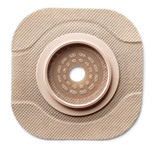Coping With Ostomy Surgery Anxiety — 5 Tips For Caregivers
Learn from Kerri Consigli, a nurse and caregiver herself, how to care for your loved one while still taking care of yourself.

Learn five healthy ways caregivers can relieve their ostomy surgery anxiety
By Kerri Consigli, BSN, RN, CWOCNMy husband Adam and I met on Match.com, and on our first date he discovered that I was an ostomy nurse and I discovered that he had an ileostomy. We hit it off immediately. Then, six months into our relationship, Adam had a routine visit with the physician who performed his ostomy surgery. He learned that he was going to need another abdominal surgery involving relocation of his stoma.
After a successful operation, he recovered better than I ever thought he would. But, let me tell you that before, during, and after his surgery I was a mess! I guess you could call it “surgery anxiety.” I had finally found the love of my life, and now all the “what-ifs” were running through my mind, and it ultimately left me anxious, depressed, and scared.
Sound familiar? That’s the tip of the iceberg of emotions that we, as caregivers, often feel when a loved one needs surgery. My experience left me asking an important question: What about support for the caregivers? I’m an ostomy nurse, so the ostomy itself wasn’t a source of stress for me. However, I recognize that this can certainly come as a challenge for many family caregivers.
My experience has taught me that part of my assessment as an ostomy nurse is to check in with who I like to call the “loved one’s other half” or the caregiver. You are what makes your other half whole (see what I did there? Ha ha!).
Bottom line: You matter, too! You, as a caregiver, are as much a part of the process as the person being cared for. You aren’t the one being operated on, but you are certainly going through that surgery anxiety. And, trust me, that doesn’t stop even after the surgery is over.
Looking back on my experience with my husband’s ileostomy, it shed some light on why I wasn’t coping well with his surgery. Self-care didn’t exist for me. I was so focused on making sure that he was okay that I forgot about caring for myself. As a result, I admittedly became a weepy, irritable, anxious monster. My physical and emotional defenses were down, and it was affecting my day-to-day life.
Everyone copes differently, but what matters most is that self-care becomes a priority and that you accept that it’s not being selfish. It’s survival. You must make sure that you maintain your health and well-being, in order to be available for your loved one.
I came up with 5 tips, while seemingly basic, that are vital to your survival in the process from pre-op to post-op ostomy surgery and beyond:
#1 – Sleep:
- Get your 8 hours. I know that when I am sleep-deprived, I am useless.
- Take a nap if you want and don’t feel the least bit guilty
- During the post-op period, go home and sleep at night. The nurses and doctors will take good care of your “special patient”.
- Rest is important. You need to be bright-eyed and clear-headed the next day so you can start the recovery process alongside the person with an ostomy.
#2 – Eat:
- Avoid a typical “stressed-out” diet of comfort foods, sweets, and junk food
- Maintain a well-balanced diet of fruits and veggies, complex carbs, and lean protein
- Drink plenty of water
- It’s okay to leave your loved one’s bedside to grab a bite to eat
- Head to the cafeteria, bring food in, or go home and make yourself a healthy meal
- Eating and hydrating properly will fuel your brain and body so you can be physically and mentally available for your loved one
#3 – Exercise:
- Keep up with your regular exercise routine. This is the time to release those endorphins.
- A brisk walk around the hospital will get your muscles moving and your blood flowing
- Any type of physical activity will help keep you alert and less stressed
#4 – Educate Yourself:
- During the pre-op phase, prepare yourself for an educational session with an ostomy nurse
- Visit reputable websites for information. United Ostomy Associations of America (www.ostomy.org) is very helpful. You can even search for a local UOAA support group by visiting www.ostomy.org/support-group-finder/ .
- Avoid online negativity and misinformation
- During post-op, be there with your loved one to receive valuable information and instructions from the ostomy nurse
- Take notes and ask questions about the stoma, ileostomy bag, or anything that comes to mind. Remember, no question is ever too frivolous to ask.
- Knowledge is power
#5 – Talk or Laugh it Out:
- Express your feelings with your loved one. Have a good cry if that’s what you need.
- Call that person in your life who can make you laugh
- Watch a funny movie or TV show. A few good belly laughs always feel amazing!
- Family caregivers can become overwhelmed. Talk it out with other family members or a close friend.
- Do not worry or suffer in silence. Look for a shoulder to lean on.
Yes, surgery is stressful both for the patient and the caregiver. And having an ostomy creates a major life change for both people in a relationship. You need to just keep in mind that you are the most important person for your loved one, and because you are so important, you must remember not to lose yourself in the whole process. Simply put, take good care of you.
Kerri Consigli is a certified Wound, Ostomy, and Continence Nurse Specialist (CWOCN) at Milford (MA) Regional Medical Center. Ostomies are a constant in her life, as husband Adam has an ileostomy. She balances her time being a wife and mother with making a difference for ostomy patients in her community.
Financial Disclosure: Kerri Consigli received compensation from Hollister Incorporated for her contribution to this eNewsletter.
- 15 Shares
- 60 Recommended





 Call Us
Call Us  Email Us
Email Us  Join Us!
Join Us!  Sign Up
Sign Up 